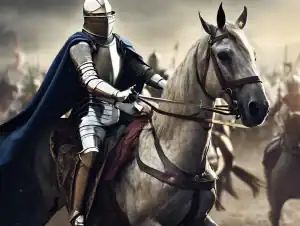When most people think of medieval knights, images of clashing swords and gallant tournaments come to mind. But the reality was far more complex. Knights lived by a web of duties that extended from the battlefield to the church and the manor. Here are the top 10 duties of a medieval knight, explained in detail.

⚔️ 1. Serve in Battle
The knight’s primary duty was military service. Knights fought as heavy cavalry, charging into battle to defend their lord’s lands or expand his power.
🤝 2. Swear Loyalty to Their Lord
Knights were bound by fealty oaths to serve their lord faithfully in exchange for land, money, or protection. Breaking this oath meant disgrace—or death.
🏰 3. Defend the Castle
Knights were tasked with guarding castles, fortresses, and towns. They acted as elite defenders, ensuring the lord’s estate remained secure.
✝️ 4. Uphold Christianity
Knights were also warriors of faith, often fighting in the Crusades, protecting pilgrims, and defending the Church’s interests.
⚖️ 5. Protect the Weak
According to the chivalric code, knights had to defend widows, orphans, peasants, and clergy from harm. While not always reality, it was an ideal they were expected to uphold.
🏇 6. Train for Warfare
A knight’s life involved constant training in horsemanship, swordsmanship, and jousting. Skill in battle was essential to maintaining honor and reputation.
🎖️ 7. Follow the Code of Chivalry
Chivalry demanded honor, courtesy, bravery, and mercy. Knights were expected to act with dignity in war and peace, even if reality didn’t always match the ideal.
📜 8. Administer Justice
Knights sometimes served as local enforcers of law, carrying out punishments, resolving disputes, or protecting their lord’s rights over the land.
🍷 9. Attend Court and Ceremonies
Knights were part of the lord’s court, attending feasts, tournaments, councils, and religious ceremonies, reinforcing loyalty and social order.
🛡️ 10. Preserve Honor and Reputation
Above all, a knight had to safeguard his personal honor and family name. Dishonor in battle or betrayal of trust could ruin an entire lineage.
💡 Did you know? Knights could spend as much time in courtly life—feasting, entertaining, and managing estates—as they did in actual combat. The reality was often less heroic and more political.
📜 Conclusion
The duties of a medieval knight went far beyond charging into battle. They were warriors, enforcers, protectors, and symbols of an idealized code. While the chivalric image may have been more legend than reality, the knight’s many roles made them central to the story of the Middle Ages.
How did knights train for their duties?
Knights trained from childhood as pages and squires, learning horsemanship, swordsmanship, and the skills needed for war and chivalry.
Did knights only fight in wars?
No, knights also served in courts, ceremonies, tournaments, and as enforcers of justice, making them central figures in medieval society.
Why was loyalty important for medieval knights?
Knights swore oaths of fealty to their lords, promising military service and obedience in return for land, rewards, or protection.
Did all knights follow the code of chivalry?
Not always. While knights were expected to follow the chivalric code of honor, loyalty, and courtesy, many acted ruthlessly in pursuit of power.
What were the top duties of a medieval knight?
The top duties of a medieval knight included fighting in battle, serving their lord, protecting the weak, defending castles, and upholding the code of chivalry.
What role did religion play in a knight’s duties?
Knights were expected to defend Christianity, protect the Church, and sometimes join religious wars such as the Crusades.






